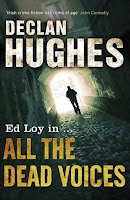
When his newspaper editor dies, a photograph in one of the man’s personal folders sets Owen Simmons, the Dublin-based narrator of NOT UNTRUE & NOT UNKIND, reminiscing about his time as a correspondent in Africa, when he reported from South Africa, Zaire and Sierra Leone, among other hot-spots. One of a loose grouping of correspondents and photographers who roamed the continent in pursuit of the latest war, atrocity or military coup, Simmons has the detached tone and sharp eye for detail of a good journalist, even when writing about Beatrice, the photographer he falls for with despite his professional and personal cynicism.
Ed O’Loughlin reported on Africa for eight years as a correspondent for ‘The Irish Times’, and here his debut fiction rings with a rare authenticity. As they pick their way through a rat-infested refugee camp massacre in search of ‘colour’ for their feature stories, for example, one of the journalists calls out to his colleagues. “‘Has anyone seen the other half of this baby?’ he asked. ‘We mustn’t count it twice.’”
It’s a moment to make even the most hardened reader of gory novels wince, but O’Loughlin is not in the business of sensationalism. Simmons bears witness to what seems at times a daily litany of tragedy, but does so in a clipped, understated fashion. The novel has been compared with the works of V.S. Naipaul and Graham Greene, but there’s a measure of Ernest Hemingway here too. The prose is muscular and delicate, the mark of a writer who knows his own strength and is sure of his aim. In the chaos of a jungle fire-fight, ambushed by the latest in an interminable series of half-naked rebel forces, Simmons observes a jeep make “a slow and sedate turn towards us, part-sheltered by the hulk of the armoured car … its indicator piously winking.” Later, at a conference in Durban, he observes: “By the time I’d finished reading, the tide in the foyer had receded, stranding little pools of gossipers and the odd scuttling newcomer.”
O’Loughlin, who has also reported on the Middle East, might have been expected to write a political treatise disguised as a novel. But while there is at one point a brilliantly sustained piece of ice-cold vitriol directed at the professional charity operatives, who “spend years dodging from one short-term contract to the next, chasing the funds as compassion flits from disaster to disaster”, the novel is almost perversely blinkered in the way it follows the fortunes of its characters without ever stepping back from the fray to make grand statements about the whys and wherefores of the conditions and situations they find themselves in. The journalists are there to dispassionately observe and report back to the outside world, and Simmons mimics their apparently callous tones as he records for the reader their words and deeds, very few of which derive from philanthropic or ideological motives.
In another writer’s hands, the tale of last-minute evacuations, jungle ambushes, flights into and out of cities on the brink of fall or liberation, and discreet but passionate affairs, would have resulted in a full-tilt sprint delivered in breathless prose. Instead, NOT UNTRUE & NOT UNKIND offers a meandering and at times deliberately obtuse narrative, one that shuffles and weaves, moving to an odd but quickly addictive rhythm. So much so, in fact, that it’s tempting to believe that O’Loughlin has composed the story in a style that conjures up outsiders’ perceptions of, and prejudices about, Africa. Certainly, having referenced the ‘Rumble in the Jungle’, in which Muhammad Ali outfoxed George Foreman in Kinshasa by spreading himself on the ropes and absorbing inhuman levels of punishment before landing a killer blow, O’Loughlin provides a final twist that reveals his tale, and Simmons’ cynical posturing, to be a literary version of Ali’s legendary ‘rope-a-dope’ trick.
Laced with the blackest of humour, studded with glints of hard-edged poetry, and underpinned by a poisonously cynical mindset that is as repulsive as it is compelling,
NOT UNTRUE & NOT UNKIND is one of the most powerful debut Irish novels of the last decade.
This review first appeared in the
Sunday Business Post
 The Irish Books Awards crime fiction shortlist was announced today, for novels published in the last twelve months, and there’s nary a sign of John Connolly, Ken Bruen, Declan Hughes or Adrian McKinty. Sacrilege! X 4! Happily, there is Alex Barclay (right) (BLOOD RUNS COLD), Arlene Hunt (UNDERTOW), Tana French (THE LIKENESS) and Brian McGilloway (GALLOWS LANE). Quoth the blurb elves:
The Irish Books Awards crime fiction shortlist was announced today, for novels published in the last twelve months, and there’s nary a sign of John Connolly, Ken Bruen, Declan Hughes or Adrian McKinty. Sacrilege! X 4! Happily, there is Alex Barclay (right) (BLOOD RUNS COLD), Arlene Hunt (UNDERTOW), Tana French (THE LIKENESS) and Brian McGilloway (GALLOWS LANE). Quoth the blurb elves: 






































